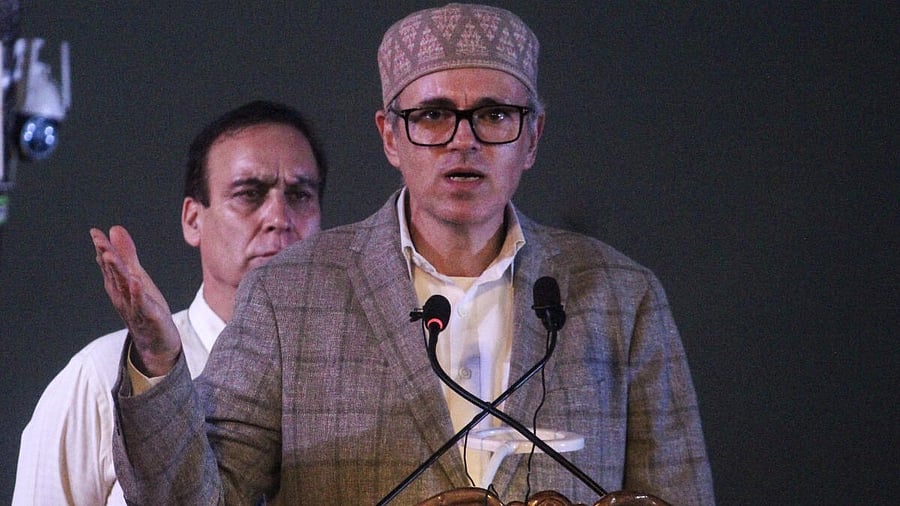
Jammu and Kashmir Chief Minister Omar Abdullah.
Credit: PTI Photo
The Supreme Court’s latest observation on the restoration of Jammu and Kashmir’s statehood has set off fresh political manoeuvring in Srinagar and sharpened the pressure on Chief Minister Omar Abdullah’s almost year-old government.
Last week, while hearing a petition seeking directions to the Union government to fulfil its assurance of statehood for J&K, the apex court asked petitioners to be “mindful of ground realities,” specifically citing the April 22 terror attack that killed 25 tourists and a local resident at Baisaran in Pahalgam in J&K. The court gave the Centre eight weeks to respond but stopped short of issuing any binding order.
For much of India, the case may seem procedural. But, in J&K, where the abrogation of Article 370 of the Constitution and loss of statehood in August 2019 had triggered a political tremor, the stakes are existential.
In his Independence Day speech at Srinagar’s Bakshi Stadium, Chief Minister Omar Abdullah announced a door-to-door signature campaign across all 90 Assembly constituencies, pledging to present the demand for statehood directly to the Supreme Court before the Centre files its reply.
“This is not just about status. It is about our dignity,” he said. “If people are not ready to sign, I will accept defeat.”
The campaign is Abdullah’s boldest political move since the National Conference (NC) returned to power last year with a clear majority, riding on promises to fight for the restoration of statehood for J&K.
Prime Minister Narendra Modi and Union Home Minister Amit Shah said that statehood would be restored “at an appropriate time” once security stabilises.
Holding on to Union Territory status gives the Centre direct control over a sensitive region and slows down the NC’s consolidation of power. For the BJP’s base in Jammu, the UT framework is framed as protection against “separatist-friendly politics” in the Valley.
“This approach is not without political cost,” said Prof Gul Mohammad Wani, a political analyst. “Many in J&K who voted for the NC in 2024 expected faster progress. The perception that Omar cannot deliver on his core promise plays directly into the BJP’s narrative that regional parties mislead people on constitutional issues.”
Before August 5, 2019, J&K had its own constitution, flag, and considerable autonomy under Article 370. Parliament’s decision to abrogate the provision and split the state into the UTs of J&K and Ladakh was justified by the Modi government as essential for integration and to curb separatism.
The BJP has since argued that the reorganisation has strengthened security, citing reduced militant recruitment and fresh investment proposals. Regional parties counter that political disempowerment and bureaucratic control have deepened alienation instead of fostering integration.
Abdullah now faces the dual challenge of retaining public trust while negotiating with a Centre that holds all the cards. His signature drive seeks to demonstrate visible, quantifiable support that can bolster his political and legal case. Yet without Delhi’s willingness, even overwhelming public backing cannot force immediate change.
“For the NC, the risk is that the campaign raises expectations that cannot be met soon,” Prof Wani noted. “In a place where credibility can collapse overnight, this could erode the goodwill from last year’s victory."
For the BJP, the Supreme Court’s eight-week window provides breathing space. Party strategists intend to use the period to highlight security threats — particularly after the Pahalgam attack — as justification for caution. By keeping the debate anchored in national security, the party can reassure its base across India while deflecting accusations of political obstruction in J&K.
The BJP is also preparing for municipal and panchayat polls later this year, aiming to expand its grassroots footprint in the Valley, where it has long struggled.
The standoff is more than a local dispute. It is a test of how India balances federalism, security, and democratic aspiration in the post-Article 370 era. The eventual outcome will shape Centre–state relations well beyond J&K, setting precedents for how far Delhi can go in restructuring a state’s constitutional status — and how easily it can reverse course.
As the Supreme Court’s eight-week deadline approaches, Abdullah is betting on a groundswell of public support to shift the political equation. The BJP is betting that time — and the shadow of security concerns — will blunt the pressure.
Ultimately, the question is not whether J&K will regain statehood, but on whose terms it will happen.